This article was co-authored by Michael Corsilles, ND. Dr. Corsilles is a Naturopath and a Physician Assistant in Washington. He completed his Naturopathic medical training at Bastyr University in 2003, and received his Physician Assistant certification from the University of Washington in 2010.
There are 24 references cited in this article, which can be found at the bottom of the page.
wikiHow marks an article as reader-approved once it receives enough positive feedback. In this case, 84% of readers who voted found the article helpful, earning it our reader-approved status.
This article has been viewed 190,538 times.
Getting a shot can be terrifying for anyone, whether you're an adult or a child. Belonephobia is an extreme fear of needles, and it affects about 10 percent of the population.[1] You likely know from experience that the anticipation of the shot is worse than the pain itself. Luckily, there are ways to manage your or your child's anxiety and get you through this important part of the healthcare routine.
Steps
Preparing to Get a Shot
-
1Get mentally prepared. Take a deep breath and think about how fast the time will go. To think positive thoughts, promise yourself a reward after the experience, like you might do for children. Go get that burger from your favorite restaurant, even if you're on a diet.
- Remind yourself that the shot is going to help you in the long run. Whatever shot you're getting, it's for your own health.
-
2Ask a friend to come with you. Think of the person you most trust to comfort you and not make you feel ashamed of your fear. Ask him or her to come to the doctor's office with you and help you stay calm. They can hold your hand, talk you through your anxiety, or just listen to your concerns while you wait.
- Bringing a childhood comfort toy, like a teddy bear, can also make the experience a lot more bearable. Don't be embarrassed about it — do whatever you need to make sure you go through with this shot.[2]
- You might also listen to music on your phone or iPod to distract you while you wait. You can even do this while you're getting your shot!
Advertisement -
3Be open with your health care provider.[3] Tell him or her that you flat out don't like shots. Talking about your fear will both make you feel better and let the person giving you the shot know that they need to be more cautious with you.
- Ask them to give you the shot in whichever way causes you the least stress. You might ask the provider to count to three before giving you the shot, so you’ll know it’s coming. Or, you might want to look away and have him give the shot without warning.
- Understanding how the shot will help might set your mind at ease. Ask the provider to tell you how it will make your life better. You can request a handout with information about the shot, as well.[4]
-
4Ask your doctor to prescribe EMLA cream before your shot. This prescription lidocaine cream numbs the skin, so you won't be able to feel the injection. When patients use EMLA cream, the feel less pain and anxiety while getting shots.
- Adults: Apply 2.5g of the cream to a 7-10 inch (20-25 cm) area of skin on the upper arm/shoulder, where you'll get the shot. Cover it up with a bandage, and leave the cream on your skin for at least an hour.[5]
- Children: ask your doctor whether you should use EMLA cream on your child.
- Side effects include pain, swelling, burning, redness, paleness, and temperature sensation change.
Calming Your Nerves During the Injection
-
1Distract yourself with positive thoughts during the shot. Think of something that always makes you laugh, or recall your happiest memory. One recent study even showed that thinking about butterflies, flowers, fish, and smiley faces relaxed people while getting shots.[6]
-
2Avoid looking at the needle. Seeing it might make you feel worse, especially in the moments leading up to and during the injection itself. Don't look at the supply tray or table, either! Just close your eyes and breathe.[7]
-
3Relax your arm completely before getting the shot. Practice dropping your shoulder and lightly pressing your elbow against your waist. Doing so relaxes the Deltoid muscle, where you usually get shots.[8] Not only will the shot itself hurt less, but your arm will feel better more quickly than if you tense up during the injection.
-
4Be conscious of your breathing. Take a deep breath right before the shot, and exhale slowly during it. Slow, deep breathing temporarily helps with pain relief because it relaxes muscle tension. Also blowing in and out while the shot is given. [11] Deep breathing also lowers blood pressure, balances the pH level in our bodies, and helps in avoiding harmful stress hormones.[12]
-
5Move your arm immediately after the shot.[13] By working the muscles at the injection site immediately, you increase blood flow to the area. This, in turn, speeds up the healing process. In the hours and days after your shot, keep moving your arm about to speed up the recovery process.
-
6Do not take a painkiller to relieve the pain. A recent study showed that pain killers such as Ibuprofen, Advil or naproxen taken just after the HPV vaccine reduced the shot's effectiveness. Researchers believe other vaccinations may respond the same way. The painkiller causes the body to build up antibodies that work against the vaccine. To avoid this, just deal with whatever pain you're feeling. You can add an ice pack or cool compress for about 15 minutes to the injection site to relieve pain.[14] You can get through it!
Helping Your Child Get a Shot
-
1Empathize with your child. Even for adults, the thought of getting poked with a needle can be frightening. Kids, with their big imaginations, tend to be even more afraid. About 2-8% of children have an actual phobia of shots, but all kids need to feel compassion and care to face an injection.
-
2Try to breastfeed if you have a baby receiving the shot. A recent study that examined ways to help babies in pain showed that breastfeeding reduces pain in babies.[15] [16] The familiar, soothing action helped calm infants down while they got shots. Their heart rates remained stable, and the babies did not tense up or cry. If breastfeeding is not an option for you, try one of the following with your infant:
- Give him or her a pacifier to suck on
- Provide soothing skin-to-skin contact
- Swaddle the baby
- Give him or her glucose water drops with a pacifier
- Place a musical mobile 20-25 cm (8-10 inches) above the baby[17]
-
3Talk calmly with some children about getting the shot. Children learn from their parents, so don't put negative ideas about the shot in their heads. Talk to them about what will happen at the doctor’s office, but act like it's a normal part of life, not a big deal they should worry about. The more relaxed your attitude toward the shot is, the more relaxed your child will be when getting one.[18]
-
4Call the shot by a less frightening word.[19] Some children might associate the word "shot" with guns and serious injuries. To avoid unnecessary anxiety, call the shot something more positive. "Booster" or "super booster" reframe the injection as something that will make them strong, not hurt them.
-
5Read a book about shots with your child.[20] [21] There are many educational children's books on the market that can set your child's mind at ease. One of the scariest things about getting a shot is not knowing what's going to happen. These books provide information about the process and can make children feel more secure.
-
6Talk with the health care provider about ways to make it easier on the child.[22] The person giving the shot can make a big difference in your child's experience. One successful strategy is to have the health care provider give the child a choice of how many boosters they want to receive. If your child is due for one shot, have them ask "Do you want one or two boosters today?" If your child is due for two shots, ask "Do you want two or three?" Children almost always choose the smaller number, and in doing so, feel like they had a say. If the health care provider gives them a choice in the matter, children relax and feel more in control of the situation.
-
7Talk to the doctor about EMLA numbing cream.[23] As discussed in the previous section, EMLA is a numbing cream that can reduce pain if applied hours before the shot. However, it doesn't always work perfectly, so your child might still feel some pain. It's a prescription cream, so talk to your pediatrician ahead of time about whether they recommend using EMLA on your child.
-
8Distract the child during the shot. Before getting the shot, talk to them about what they are going to hold, look at, or do during the shot to distract themselves. Some children may want to sing, while others might prefer to hold a bear or favorite blanket. Children sometimes find it calming to be quiet and look a parent in the eyes for comfort. Talking about what you're going to do ahead of time will help your child stay calm in the moment.
- You can also distract the child by reading a book, playing music, or playing an educational game with him or her during the shot.[24]
-
9Be your child's best cheerleader during the shot.[25] When the time comes, maintain a positive, cheerful attitude. If you show how worried you are about your child's reaction, chances are good that your child will pick up on your anxiety. Instead, be a good coach. Tell him or her that they're doing a great job, that you've never seen anyone be so good at the doctor's office before. Cheer them on however you want.
-
10Promise a reward for getting through it.[26] When preparing them for their booster, tell children that there will be a prize on the other end of the doctor's visit. It might be as simple as candy or ice cream cone, or you might go big with a trip to their favorite place.
- Don't tell them that the prize depends on whether they cry or not. Crying during the shot is alright. They just have to make it through the doctor's visit to get their reward.
-
11Be careful with pain relievers. Doctors don't recommend giving children Tylenol before getting a shot. It's actually normal for the body to have a low-grade fever after a shot.[27] Only if the fever rises above 101 °F (38.3 °C) should you use Tylenol to bring it down. A little bit of pain or fussiness after a shot is also normal, so don't use a pain reliever unless your child complains about a lot of pain.
Warnings
- If you work out before the shot, be sure to do it an hour before you receive it, as this could raise your blood pressure, which could potentially be harmful for some people.⧼thumbs_response⧽
- Do not run away from the shot; it could be dangerous! Besides, you're going to have to get it eventually.⧼thumbs_response⧽
- Don't try to attack the doctor.⧼thumbs_response⧽
- Do not push the doctor's hand away; you could get hurt.⧼thumbs_response⧽
- Remember, the shots are often far less unpleasant than the diseases they protect you from.⧼thumbs_response⧽
References
- ↑ http://www.medscape.com/viewarticle/555513
- ↑ http://news.bbc.co.uk/2/hi/uk_news/magazine/7219597.stm
- ↑ http://www.medscape.com/viewarticle/555513#vp_3
- ↑ http://www.cdc.gov/vaccines/hcp/vis/index.html?s_cid=cs_74
- ↑ http://reference.medscape.com/drug/emla-oraqix-lidocaine-prilocaine-343663
- ↑ http://www.medscape.com/viewarticle/555513
- ↑ http://www.howtocopewithpain.org/resources/relaxation-visualization-exercise.html.
- ↑ http://www.innerbody.com/image_musfov/musc12-new.html
- ↑ http://abcnews.go.com/Health/PainManagement/story?id=4072974
- ↑ http://www.dchs.nhs.uk/assets/public/dchs/services_we_provide/service-directory/our-services/health-psychology/Information-sheets/Relaxation%20and%20Pain%20-%20Communications.pdf
- ↑ http://www.dailymail.co.uk/health/article-1247878/How-breathing-deeply-reduce-pain.html
- ↑ http://www.npr.org/2010/12/06/131734718/just-breathe-body-has-a-built-in-stress-reliever
- ↑ http://info.totalwellnesshealth.com/blog/how-to-avoid-a-sore-arm-after-your-flu-shot
- ↑ http://www.webmd.com/children/vaccines/tc/immunizations-home-treatment
- ↑ http://www.ncbi.nlm.nih.gov/pmc/articles/PMC4089043/
- ↑ https://www.sciencebasedmedicine.org/vaccines-are-a-pain-what-to-do-about-it/
- ↑ http://www.ncbi.nlm.nih.gov/pmc/articles/PMC3685783/
- ↑ http://www.whattoexpect.com/child-vaccinations/coping-with-shots.aspx
- ↑ http://blogs.webmd.com/all-ears/2009/06/shots-hurt-how-to-ease-the-pain-for-kids-and-parents.html
- ↑ https://www.amazon.com/Lions-Arent-Scared-Shots-Children/dp/1591474744/ref=sr_1_1?s=books&ie=UTF8&qid=1427903977&sr=1-1&keywords=getting+a+shot
- ↑ http://www.amazon.com/s/ref=nb_sb_noss_1?url=search-alias%3Dstripbooks&field-keywords=going%20to%20the%20doctor&sprefix=going+to+the+doc%2Cstripbooks
- ↑ http://blogs.webmd.com/all-ears/2009/06/shots-hurt-how-to-ease-the-pain-for-kids-and-parents.html
- ↑ http://seattlemamadoc.seattlechildrens.org/6-tips-for-successful-shot-visits/
- ↑ http://www.healthline.com/health/big-shots-children-overcome-fear-of-needles#.VRGmmOmlGM8&panel1-4
- ↑ http://www.medscape.com/viewarticle/820548
- ↑ http://blogs.webmd.com/all-ears/2009/06/shots-hurt-how-to-ease-the-pain-for-kids-and-parents.html
- ↑ http://seattlemamadoc.seattlechildrens.org/6-tips-for-successful-shot-visits/
About This Article
If you need to get a shot, don’t be embarrassed if you’re feeling scared since a lot of people are afraid of getting shots. Instead, focus on positive thoughts like how it’s going to help you. You can also ask a friend to come with you to your appointment to help you stay calm. Before you get the shot, let your healthcare provider know that you’re nervous so they can ease your worries. It may seem hard, but when it’s time to get the shot, try and relax since being tense can make it hurt more. Don’t look at the injection either since that might make you feel worse. For more help from our Medical co-author, including how to help your child get a shot, scroll down!
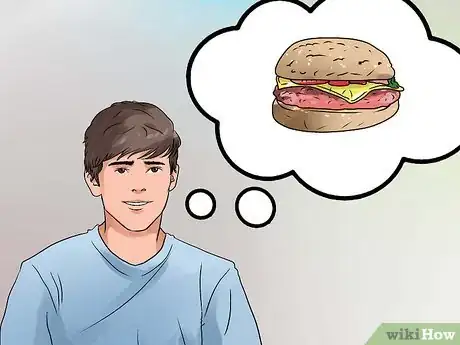
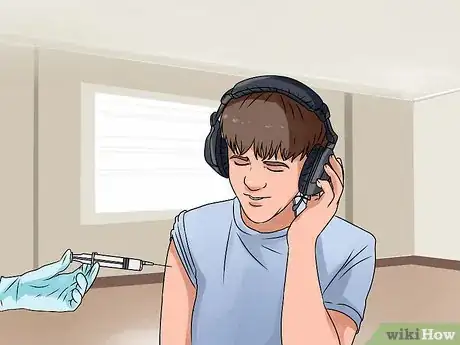
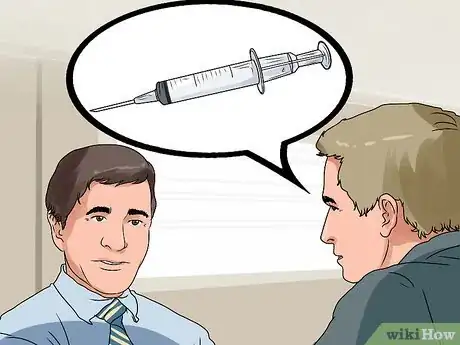
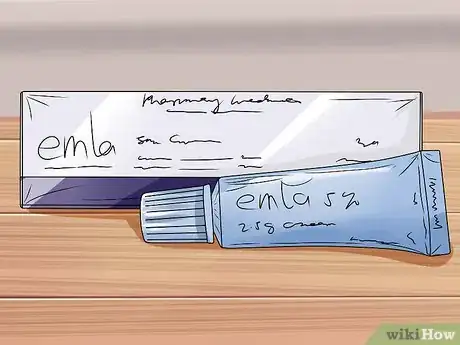
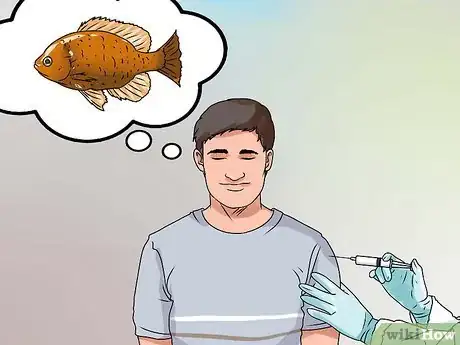
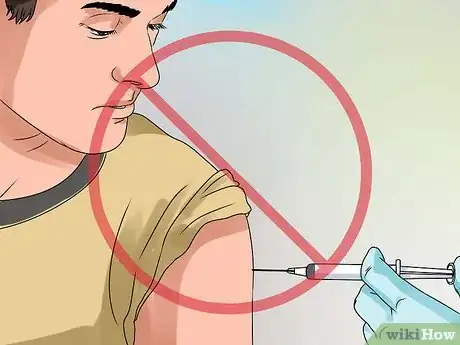
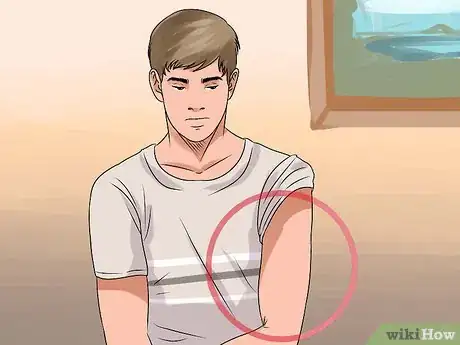
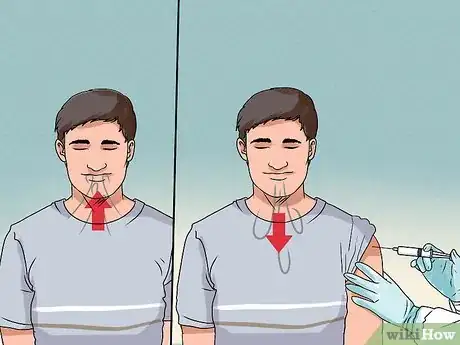
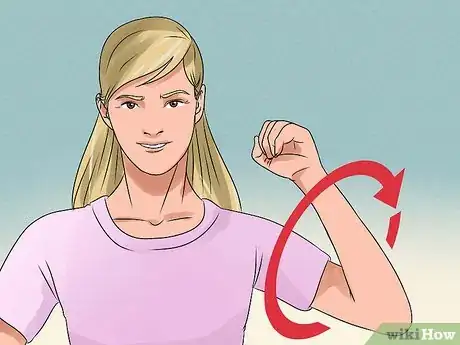
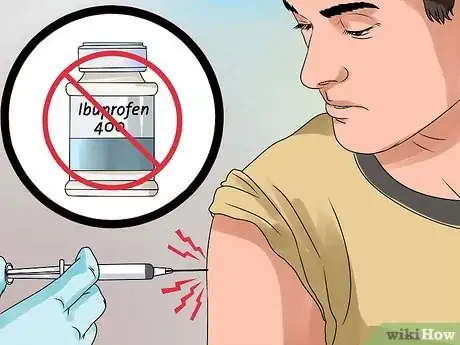
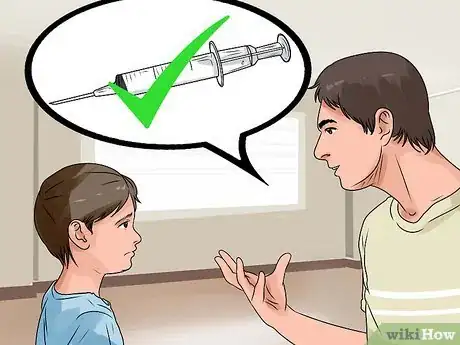
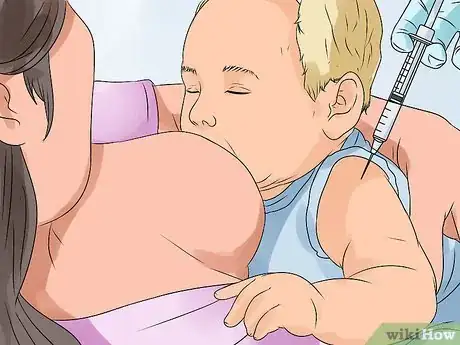
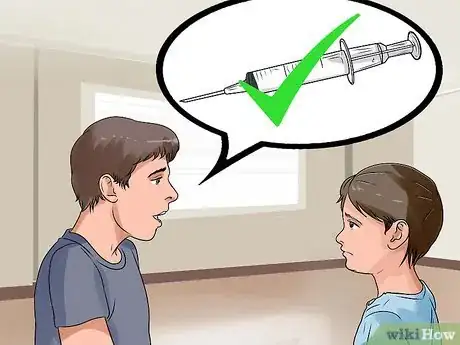
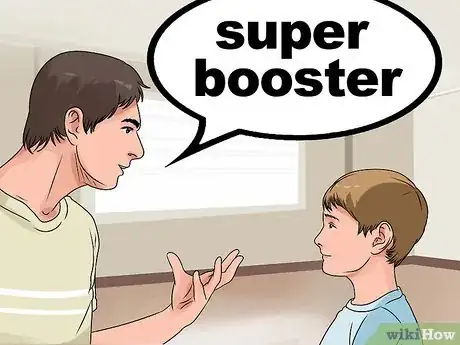

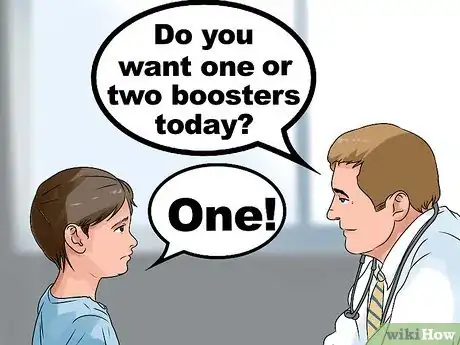
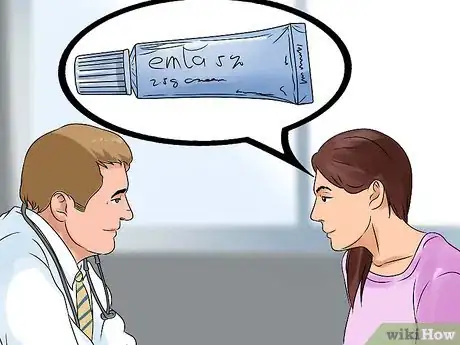
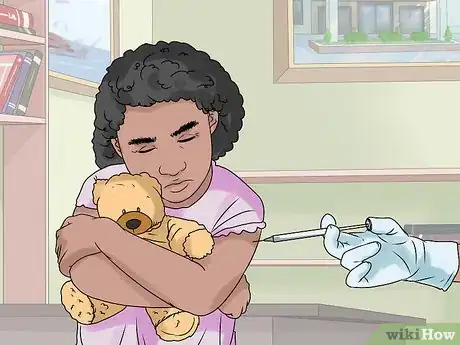
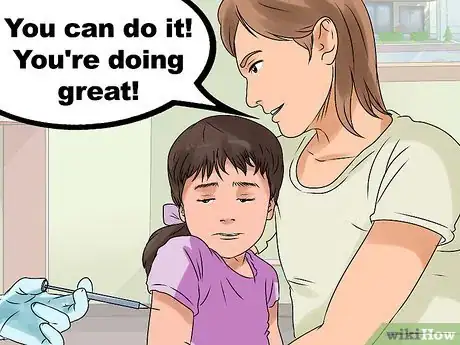
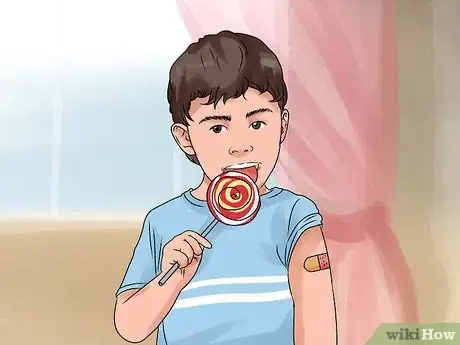
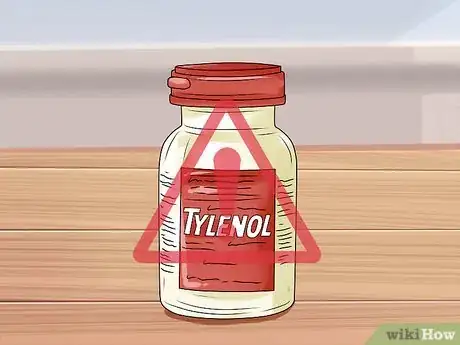
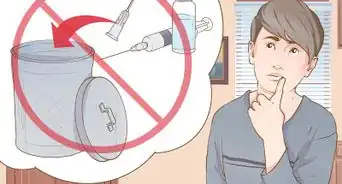


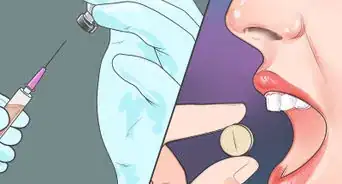
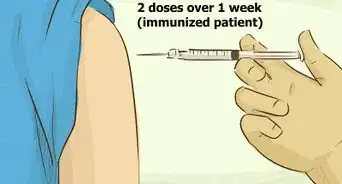

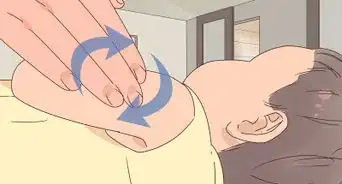
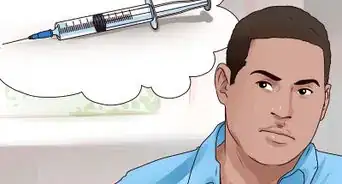

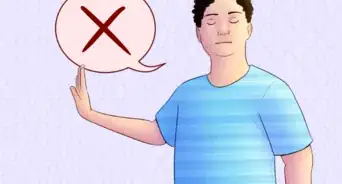
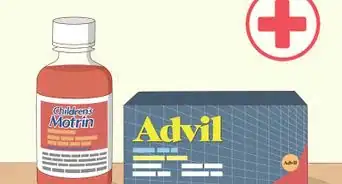












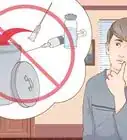
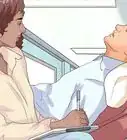
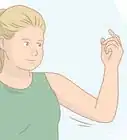
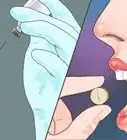



































Medical Disclaimer
The content of this article is not intended to be a substitute for professional medical advice, examination, diagnosis, or treatment. You should always contact your doctor or other qualified healthcare professional before starting, changing, or stopping any kind of health treatment.
Read More...